ROBERT WILLIAMS BUCHANAN (1841 - 1901)
|
ROBERT WILLIAMS BUCHANAN (1841 - 1901) |
|
|
|
|
|
|
|
|
DIARY ARCHIVES (4)
2021 to 2022
15 August 2021 Sweeping up Looking back, I haven’t added anything to the site since 28th December last year. Which is not true. The company which ‘hosts’ my site usually takes the money for it a couple of months before it’s due, but this year there was a delay and they sent me another email, obviously just to see if I was still alive, so I had to upload something to the site, and the money went out of the bank the next day. Nice to know somebody’s watching. Anyway, looking back, I haven’t added anything ‘significant’ to the site since 28th December last year. Blame COVID. One thing I have started doing is going through all the newspaper files I’ve accumulated over the years in order to find all those which have a passing mention of Robert Buchanan, or Harriett Jay, but which don’t really fit into any section of the site. This will probably take some time, so I thought I might as well add what I’ve got so far. You’ll find them in the Miscellanea section under One of the delights of going through old newspapers is coming across odd stories of “hate, murder and revenge”. One particular page of The Yorkshire Evening Post of Saturday, 16th November, 1929, which had been picked up on a search for When Knights Were Bold (the Bromley Challenor car crash), contained three such tales. One relating to the mysterious death of the Hon. Richard Bethell, who had worked with Howard Carter on the tomb of Tutankhamun, another to the murder of Mrs. Rosaline Fox, both of which have an afterlife in the world wide web. But then there’s the following case, which remains a mystery. |
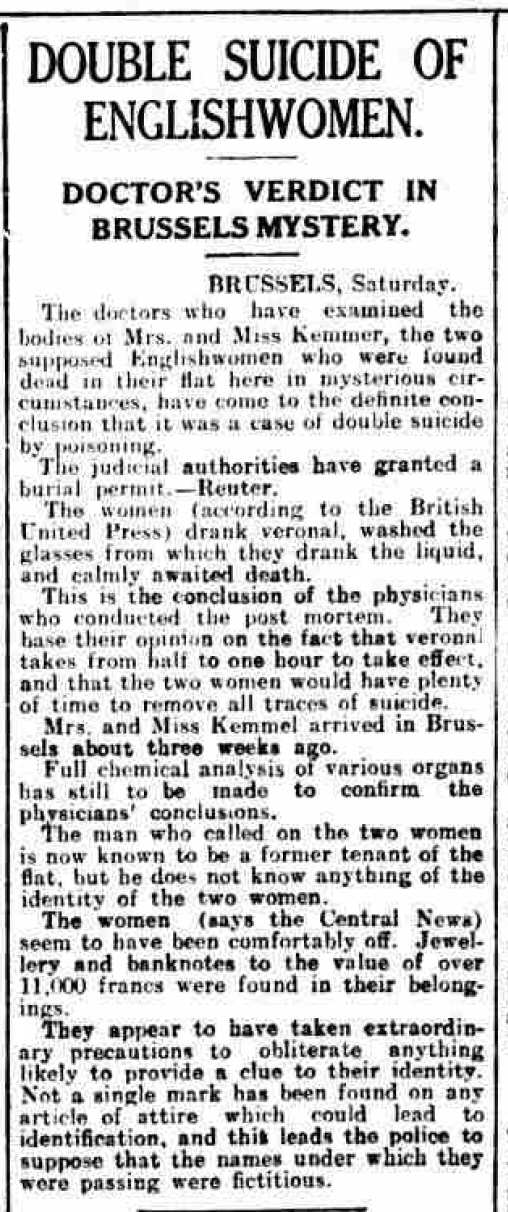 |
|||
|
Sweet Nancy I must thank Joel Green, who sent me a copy of a Sweet Nancy programme for the Avenue Theatre, London from January, 1898. The programme belonged to his Great Great Grandparents, William and Hilda Green. According to Hilda’s diary: “Just before Christmas, Hilda and Margaret were joined by "Father" (William), who had come from Colorado. January 10, 1898, the family went to London for a week's visit and sight-seeing. They saw all the famous old buildings and museums and saw several plays and operas. They returned to Yarm on the 18th.” ___
Herbert Spencer I also have to thank Janet Fizz Curtis, who is researching Irene Mawer, and who emailed to ask about the quotation from Balder the Beautiful inscribed on her memorial in Oxford Crematorium (“All that is beautiful shall abide, / All that is base shall die.”) Which, through some progression that I cannot now remember, led me to an addendum to the 'Are Men Born Free And Equal?' debate between Buchanan and Thomas Huxley in the pages of The Daily Telegraph which ran from 23rd January to 8th February 1890, ending with a letter from Herbert Spencer. Buchanan included the letters in The Coming Terror. Some background to Herbert Spencer’s intervention in the ‘discussion’ is provided in Chapter XXII: Latter Day Controversies. (November, 1889—October, 1895.) of The Life and Letters of Herbert Spencer by David Duncan (London: Williams & Norgate, 1911), including an extract of a letter from Spencer to Buchanan. ___
The Moment After I originally put the newspaper serialisation of The Moment After on the site because the book version was unavailable on the usual sites. I then added a link when it appeared on Hathi Trust. Now I’ve just got it on the site as a download, but I’ve also added a few bits not in the serial version: Chapter IX (which includes the attack on the Home Secretary, which was criticised in the Glasgow Herald’s review, as follows: The Epilogue is particularly interesting since Buchanan leaves the characters of the novel and imagines his own death and its immediate aftermath. Given the ‘living death’ which he must have endured following the massive stroke he suffered in October, 1900, the piece has an additional, rather poignant, significance. ___
Mary Another new poem to be added to the Alphabetical List of Poems on the Site occurs in a review of Buchanan’s second book of poetry, Mary, and other Poems, published in 1859 while he was still living in Glasgow, and which I doubt I’ll ever find a copy of to add to the site. The poem is below, preceded by The Literary Gazette’s reviewer’s remarks: “There is so much of high promise in Mr. Buchanan’s poetry, however, that we feel confident his maturer taste and riper judgment will discard the metaphorical absurdities in which he now indulges, and that he will achieve something which the world will not willingly let die. As a specimen both of his faults and his excellences we quote the following: GONE BEFORE. I. Many and many a joy, Mary, has come and gone with the years, II. Still, without a thought or a prayer, Mary, that is not memory-born, III. Hope and delight still kneel Mary, tho’ the darkness has fallen at last, IV. Golden-lip’d glances of love, Mary, write song on my heart no more, V. All this is fully as well, Mary, as I could wish it to be, ___
Dramatis Personæ I’ve added Buchanan’s review of Dramatis Personæ by Robert Browning to the Essays section. It appeared in The St. James’s Magazine of July, 1864 and I don’t think it was reprinted elsewhere. It begins with some digs at the Americans, which is always a delight. ___
Diary Archive And that’s about it, apart from noting that the last of the Site Diary pages has been added to the Diary Archives, where you’ll find the following: Diary Archives: I should add that although the site sprung upon an unsuspecting public on 27th August, 2002, I did not start the Diary until four years later. I blame COVID. _____
24 August 2021 Cowboys and Eton Boys I came across a couple of articles in The Theatre Annual of 1888 which I’ve added to the site. The one which I’d gone looking for was an article by Harriett Jay about her early experiences on the stage and which included a section on her preparations for playing the part of the Hon. Cecil Brookfield in Lady Clare, which entailed, among other things, hiring a genuine Eton boy to hang around the house. The article is also notable for the fact that Robert Buchanan’s name is not mentioned at all. ‘How Actresses Work’ by Harriett Jay. The other article preceded Harriett Jay’s and is of no importance whatsoever. It is by Grace Hawthorne, star of Theodora, and involves cowboys and her experiences treading the boards in the Wild West. I blame a youth spent watching the Cisco Kid, the Lone Ranger and the films of Audie Murphy. ‘A Nebraskan Experience’ by Grace Hawthorne. _____ |
|||
|
12 September 2021 Just came across this on youtube and thought it worth a mention. _____ |
|||
|
20 September 2021 More on ‘Fra Giacomo’ Having found that reading of ‘Fra Giacomo’ on youtube, I thought I should maybe add a page on the poem considering its extensive afterlife - readings, dramatisations, the musical version by Cecil Coles and the early experiment in Talkies by Eric Williams. This I have done: I also came across a prose adaptation of the poem (fully acknowledged) in the novel, Brakespeare; Or The Fortunes of a Free Lance by George Alfred Lawrence (1868). And that youtube version turned out to be a LibriVox recording available at the Internet Archive, or here. ___
The Ballad of Judas Iscariot The search for additional information about ‘Fra Giacomo’ led to a quick search for items related to Buchanan’s other great hit, ‘The Ballad of Judas Iscariot’ and on the Eclectic Theology site I found the article, ‘Robert Buchanan and “The Ballad of Judas Iscariot”’ by Addison Hodges Hart. Despite describing Buchanan as a ‘minor poet’ and dredging up the Fleshly School again (I am now resigned to it and no longer shake my fist) the article is very good, but better yet are the comments appended to it. The last of these is from David Llewellyn Dodds (who also mentions the Fleshly School - the fist is shaken) who makes the following observation about ‘The Ballad of Judas Iscariot’: ‘I suspect Buchanan is consciously interacting in some way with the “Lyke-Wake Dirge” – e.g., the “whins” here and “Whinny-muir” and “whinnes” there, and “the Brig of Dread” here and “Brig o’ Dread” there – and the general Purgatorial theme, as well as “Fire and fleet and candle-lighte, / And Christe receive thy saule” there and the developed “lighted hall” here.’ Not being familiar with the “Lyke-Wake Dirge”, I looked it up (on wikipedia naturally) and the ‘see also’ bit led me to ‘“Draumvedet” - a similar Norwegian ballad’, which is described thus: ‘“Draumkvedet” (“The Dream Poem”) is a Norwegian visionary poem, probably dated from the late medieval age. It is one of the best known medieval ballads in Norway. The first written versions are from Lårdal and Kviteseid in Telemark in the 1840s. The protagonist, Olav Åsteson, falls asleep on Christmas Eve and sleeps until the twelfth day of Christmas. Then he wakes, and rides to church to recount his dreams to the congregation, about his journey through the afterlife. The events are in part similar to other medieval ballads like the Lyke Wake Dirge: a moor of thorns, a tall bridge, and a black fire. After these, the protagonist is also allowed to see Hell and some of Heaven. The poem concludes with specific advice of charity and compassion, to avoid the various trials of the afterlife.’ On to a translation of “Draumkvedet” and, given Buchanan’s interest in Scandinavian ballads, I would think that if “The Ballad of Judas Iscariot” does have an inspiration, it would be “Draumkvedet” rather than the “Lyke-Wake Dirge”. However, this is not so obvious as the antecedents to ‘The Dead Mother’ so, we’ll leave it there. Interesting though. Minor poet, indeed! There was one more comment on Fr. Addison Hart’s article which is worth a mention. This is from Russ Hewett: ‘I did a musical treatment of The Ballad of Judas Iscariot in 2017. I find the poem very intriguing. Here’s a link to the recording on iTunes.’ I hope Mr. Hewett won’t mind if I circumvent Mr. Apple and go with the version on youtube. I’ll add him to the Buchanan’s Music page in return.
|
|||
|
27 September 2021 Another Last Letter This just turned up on ebay. I’ve put the following on the Random Letters page, and I put something similar when I discovered another of these in the collection from UCLA, so forgive me for repeating myself but I thought I should acknowledge it here as well as burying it elsewhere. |
|||
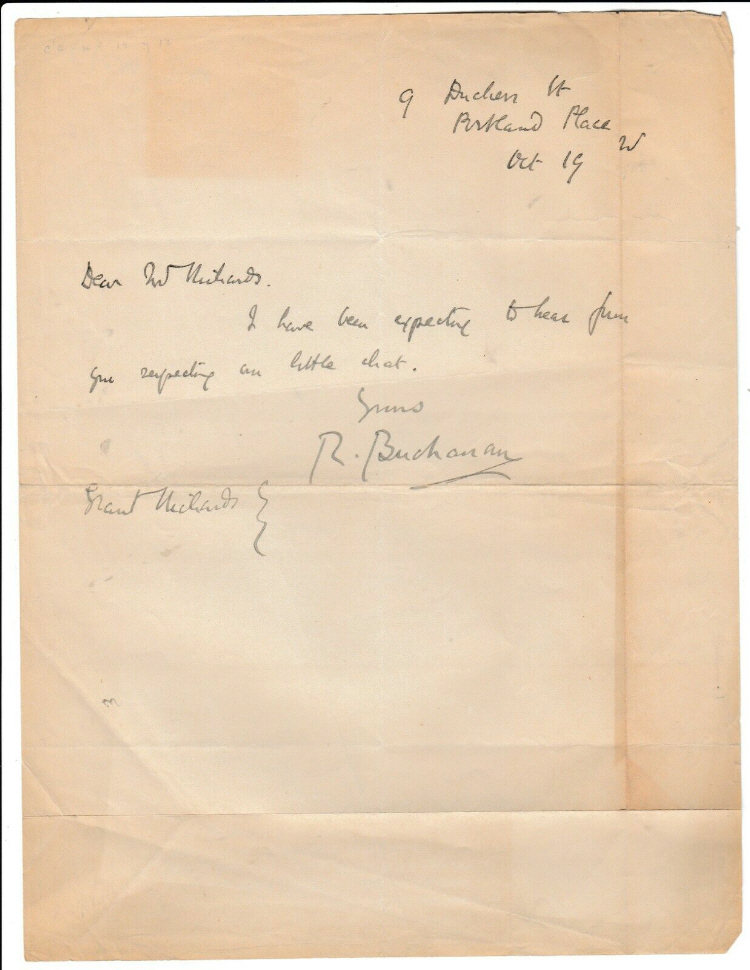 |
|
To Grant Richards - 19th October [1900]. 9 Duchess St Dear Mr Richards, I have been expecting to hear from you respecting our little chat. Yours Grant Richards Esq.
[This letter (more of a note) turned up on ebay at the end of September, 2021. At first sight it appears rather inconsequential but its significance lies in the date. Although there is no year, the address confirms it as 1900, since, as Harriett Jay states in her biography of Robert Buchanan: ‘We arrived at the rooms in Duchess Street on Monday, October 8, 1900, and all those friends who saw him at that time were amazed at the wonderful improvement in his health, for his old gaiety of spirit seemed to have come back to stay.’ And she continues: ‘His interest in his work was keener than it had been for years, and he was never tired of talking over future plans. Although we had taken rooms in the busiest part of London he continued his cycling as before, going about among the traffic with an intrepidity which filled me with terror. On Wednesday, October 17th, he went to the Avenue Theatre, saw and greatly enjoyed the performance of “A Messenger from Mars.” On the Thursday morning he interviewed several people on business, and got a little excited in conversation, and just before dinner, when we were again alone, he took up the evening paper, and after looking at it for a few minutes put it down again, saying he could not see very well. I thought he must have tired himself and persuaded him to cease 312 reading till after dinner. The symptom passed away and he thought no more of it. So, this letter to Grant Richards is one of the half dozen letters Robert Buchanan wrote just before suffering the massive stroke from which he never recovered. There is another letter (to the editor of The Star), presumably from the same batch, in the Charles E. Young Research Library at UCLA, which is available on this site. It does seem strange to me that, considering how many of Buchanan’s letter have been lost, two have survived from the final half-dozen. As for this one and the possible subject for Buchanan’s ‘little chat’ with Grant Richards, there may be a clue in the following description of a letter in the Mortlake Collection of Pennsylvania State University: “ALS, 27 September 1900, to publisher Grant Richards, about three books, Latterday Letters, Recollections, and The Coming Terror.” Judging by the first two titles this was probably an attempt by Buchanan to interest Richards in publishing his autobiography, which had been rumoured to exist since 1884. _____
15 November 2021 Late News Robert Buchanan died at 90, Lewin Road, Streatham in 1901 (said it was late) and now Lambeth Council have approved the naming of a new development between Lewin and Natal Roads as ‘Buchanan Lodge’. |
 |
|
More information and another photo at The Streatham Society where I came across the information, posted by Mark Bery, the Society’s Secretary, on the 18th May this year (said it was late). ___ Critics Just a couple of additions to the ‘Critical Response’ section of the site: Hoxie Neale Fairchild’s assessment of Robert Buchanan and Roden Noel from Volume IV (‘1830-1880 Christianity and Romanticism in the Victorian Era’) of his Religious Trends in English Poetry (New York: Columbia University Press, 1957). This prompted me to move Roden Noel’s assessment of Buchanan to that page, and to add Robert Buchanan’s own assessment of Roden Noel (his Preface to Poems of the Hon. Roden Noel. A selection) to the ‘Essays’ section. And a complimentary assessment of Buchanan’s poetry by W. Gibson from the September and October 1877 issues of The Poets’ Magazine popped up on the Internet Archive. Coming after the Fleshly School Libel Trial of the previous year (which is referred to in the piece) this is quite refreshing. Very much a fanboy’s (or fangirl’s) response to Buchanan. Robert Buchanan in The Poets’ Magazine _____
7 March 2022 I was hoping to do this last December, or at least this January, but times are strange and getting ever stranger - COVID is forgotten and we’re in the middle of the Ukrainian crisis now with talk of a Third World War. So, everything that follows is totally unimportant. I took advantage of a Black Friday deal on the British Library Newspaper Archive site and treated myself to a month at a third off. Turned out not such a good deal to do it during December, particularly not last December, but I did come across a few items of interest, including this review of Harriett Jay’s biography of Buchanan from the London Standard of 2nd February 1903, which opens with the following unminced words: ‘We are somewhat disposed to place Miss Jay’s memoir of the late Robert Buchanan under that large class of modern biographies which might conveniently have remained unwritten. It seems to be the accepted convention that every literary person of any standing must be honoured with an elaborate “Life”; and if the arrangement gratifies the deceased author’s friends, and is found profitable by his publisher, there is no great reason to object to it. But in too many of these cases the interest, whether historical or psychological, is too slight to justify the performance on its merits: and this, we fear, must be said in the present instance. The career of Robert Buchanan needs more artistic treatment than it receives from the hands of his admiring sister-in-law to invest it with interest. Nor does the study throw much light on Buchanan’s literary works. Of these the majority were ephemeral productions which are already deservedly forgotten. There remains a residuum of beautiful poetry, finely conceived and exquisitely expressed. To the understanding of the great—but, alas! undeveloped and uncompleted—poet that was in Buchanan, this volume does not contribute much, though, perhaps, it does enable us to realise why the man, with all his gifts, and with all his feverish industry, did so little that was really worth doing. Miss Jay seems to think that Buchanan was a kind of hero and martyr, and his life the tragedy of a noble soul struggling vainly against unmerited misfortune, and the obloquy of an envious world. But that is not the impression most readers will gather from her pages. The tragedy is of another kind—that of misused opportunities, of wasted talents, of genius deliberately lowering itself to the dust. Buchanan might have said with Cassius: “The fault is not in the gods but in ourselves, if we are underlings.” If during a large part of his life, and particularly towards the close, he was in financial embarrassments, if the more reputable of his friends had long dropped his acquaintance, if the public declined to regard him with respect, or to take him seriously, the causes lie on the surface. He had abandoned his ideals, he had drifted into the frame of mind in which he would do any “shoddy” work for money, and he was, moreover, vain, egotistical, unscrupulous, and recklessly improvident. Those are not the qualities to make a man honoured and happy, whether he be a poet or a fishmonger.’ I also came across an anti-Kipling letter (not from Buchanan) but from an Archibald Gibbs in the Hereford Times of 23rd December, 1899, proving, at least, that Buchanan’s was not a lone voice crying in the wilderness. I’d only recently finished reading Adam Hochschild’s brilliant book, To End All Wars, concerning the opposition to the First World War, and I thought again of what Buchanan would have made of that ridiculous, bloody conflict, if he’d lived to witness it. And I bet he was spinning in his grave at the pathetic attempt by the BBC at the start of the ‘Centenary celebrations’ for the First World War to rewrite history and pretend that the negative attitude towards the war and the politicians and generals who waged it were the result of some kind of hippie backlash in the 1960s. Other items of note were this: The Daily Mail (Hull) (6 July, 1917 - p.1) Sir Herbert Tree’s last letter was written to Miss Harriett Jay. It was written a few hours before his death and concluded: “I am doing splendidly. This enforced rest is a blessing in disguise.” And some articles from the wonderfully-named The Kinematograph And Lantern Weekly, including this one from 5th October, 1916: ‘During a recent air-raid scare in a certain Midland town, the patrons in the local kinemas were turned out about nine p.m., and a lively controversy took place in one of the local papers as to whether the management ought not to have given pass checks for another evening to those unlucky persons who had just come in. How the manager was to know “who was who,” and how he was to get round the tax difficulty was not explained. In the course of conversation with Mr. Howe, who controls Jury’s publicity department, a rather interesting point arose in regard to the question of entering a picture theatre when a picture was, say, half-way through. There are also reviews of the film versions of Alone in London, God and the Man and the James Welch version of When Knights Were Bold. The Kinematograph And Lantern Weekly, like The Bioscope, was a trade paper, aimed at cinema managers and others in the picture business, rather than the general public, so you come across things like this, in an item on Woman and the Man: ‘Production.—The novel of Robert Buchanan’s is treated by the director, Ainleto Palermi, on frank Surrey-side lines, and the plot developments are never difficult to foresee. The wife’s divorce decision seems belated, but otherwise the action is reasonable, if heavy. A glut of very artless sub-titles, weak in punctuation, and as often as not remarkably unnecessary (such as “No!” and “Mamma!”), hammers home everything steadily. The opium den scenes are graphically sordid. I like the way the ‘dope-den’ (is that in the original play/novel? I’ll have to check) is suggested as a good way to hook the patrons. But full marks for criticising unnecessary subtitles. With the current fad for mumbly acting, intrusive music and abysmal sound mixing, I have frequent recourse to subtitles on the television (not, funnily enough when watching old films) and get annoyed at the helpful subtitles which inform me when a door closes or a glass breaks, or (a good one for a drinking game) when the characters pant. It’s about the only time that the verb, ‘pant’, is used these days, but it’s there in every subtitle track. Sorry, I’m getting very ranty (not panty). I also found some screenshots from Woman and the Man (not from The Kinematograph And Lantern Weekly - the scans from the BLNA are black and white, rather than grayscale, so the photos don’t come out well). Finally, I got round to adding a couple of reviews for a touring version of The Trumpet Call. It was over a year ago that Steve Johnson (who’s researching the actor, Byron Pedley) sent me an email suggesting I add some of the reviews from the end of 1899 to the beginning of 1900, so there’s now one from the South Shields Theatre Royal and another from the Grand Theatre in Birmingham. The latter is from 17th February, 1900 and includes the following line: “The military scenes of the drama are just now particularly acceptable, and there is a genuine ring in the enthusiasm which they nightly arouse.” So it seems that it wasn’t just The Mariners of England (from which Buchanan and Jay removed their names in April, 1898) which aroused the jingo spirit. In fact, I also came across the following from the Pall Mall Gazette of 15th January, 1896: ‘The patriotic wave is not only affecting the military dramas. It is having all sorts of unexpected effects. In “The Strange Adventures of Miss Brown” there is a German music master. The savage way in which that unfortunate German gets kicked off the stage every night was never contemplated by Mr. Buchanan, the author, nor can it be altogether approved by the English actor who plays the part. In all the outlying pantomimes the low comedians almost fight nightly for the privilege of getting down close to the footlights and saying “Made in Germany.” At Daly’s Theatre, where Mr. Coffin is vigorously singing a vigorous patriotic song, “Hands Off!” there has been introduced another piece of business intended to catch the national sentiment. Mr. Harry Monkhouse, wearing a burlesque German military uniform, and carrying a toy drum and a penny trumpet, comes on with Miss Decima Moore, who is for a time taking Miss Lind’s place, and the two sing a buffoon duet, the object of which is apparently to insult the German Emperor. It succeeds. The Censor would not allow “Hands off! Germany” in the song, although “Hands off! Germany” is just what the Government and the newspapers have been saying. It seems rather strange that he should have passed this insulting personal allusion, which is neither good patriotism, good humour, nor good business.’ ___
The Robert Buchanan Appreciation Society (Membership: 1) I came across a podcast about Robert Buchanan. It’s one in a series about Southend-on-Sea (recently granted city status following the death of David Amess M.P.) and was a bit annoying. I don’t know what I’ve been doing for the last 20 years, but whatever it is, it never reached M. G. Boulter of the Clifftown Podcast. Still, it helps keep the flame alive and I do get one mention. During the podcast Mr. Boulter visits St. John’s churchyard and then interviews Lisa Hawker, who sculpted the bust of Buchanan which was replaced on his grave on 15th March, 2011. Lisa mentions “The Robert Buchanan Appreciation Society” where “the guy Patrick there was really helpful” - so there. Unfortunately Lisa also mentioned that the Buchanan bust has lost its glasses. They survived for a year then disappeared. As well as the photos of Buchanan’s grave on this site, there is a large picture of Buchanan’s head on the Saatchi Art site. ___
The Strange Case of Robert Louis Stevenson Paternal pride forces me to mention this. In the bowels of this site you’ll find a brief mention of all the missed opportunities for writers to immortalise Robert Buchanan in their work (it’s on the Patience page in the Miscellanea section). Last December saw the publication of The Strange Case of Robert Louis Stevenson by Peter Regan, which features two Jacks (Spring-heeled and Ripper) and one Jay (Harriett). Buchanan gets a passing mention, that’s all. |
|||||||
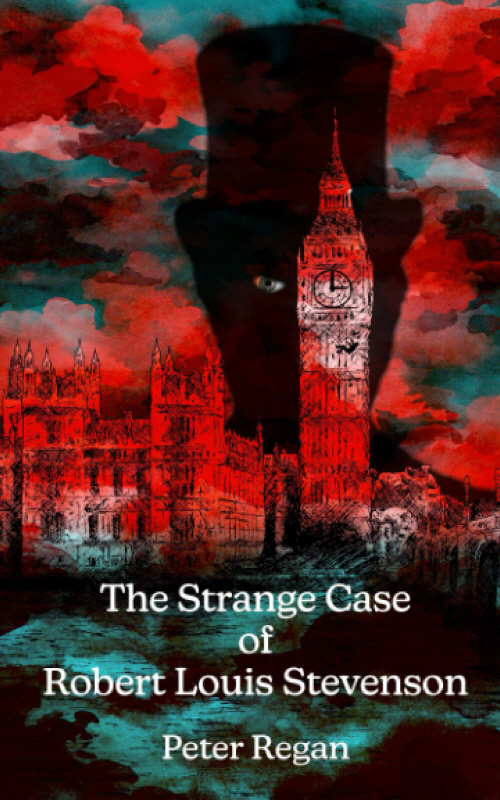 |
|||||||
|
8 May 2022 I came across a couple of items originally published in Once A Week which I hadn’t spotted before. Both were by ‘B.’ but the first: Una, the Moon-Fay; or, the Vision of Chastity is assigned to Buchanan on the Digital Victorian Periodical Poetry site and seems to fit in with that group of ‘medieval/King Arthur’ poems he was publishing in Once A Week and The St. James Magazine in the early 1860s. The other item is a short story: which was published in Once a Week on 29th June, 1861, and was then reprinted as part of Storm-beaten: or Christmas Eve at the “Old Anchor” Inn. The book was a joint venture of Buchanan’s with his friend Charles Gibbon and this is the first story I’ve come across which is by Buchanan or at least by ‘B.’ On the section relating to Storm-beaten I’ve always suggested that the poems in the book are by Buchanan and the stories by Gibbon, but I’ve now amended that. ___
Big in Germany Considering the latest publication of an English version of a Buchanan novel I have listed (barring ‘print-on-demand’ versions of course) is a Chatto & Windus reprint of Shadow of the Sword in 1924, it seems strange that German translations of God and the Man, The Martyrdom of Madeline and A Marriage By Capture were published in 2007, 2017 and 2021 respectively under the titles: Christian, Madelines Martyrium and Die Entführung. All translated by Peter M. Richter. Here’s the cover of Madelines Martyrium: |
|||||||
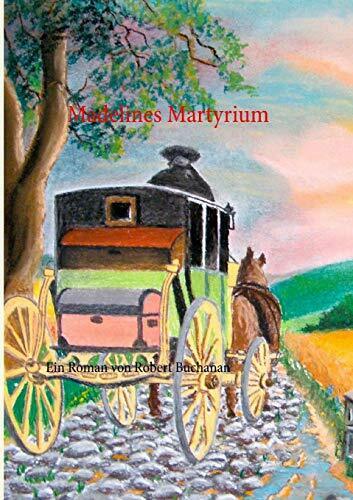 |
|||||||
|
And talking of covers, I also came across this great one for Chatto & Windus cheap edition of The New Abelard: |
|||||||
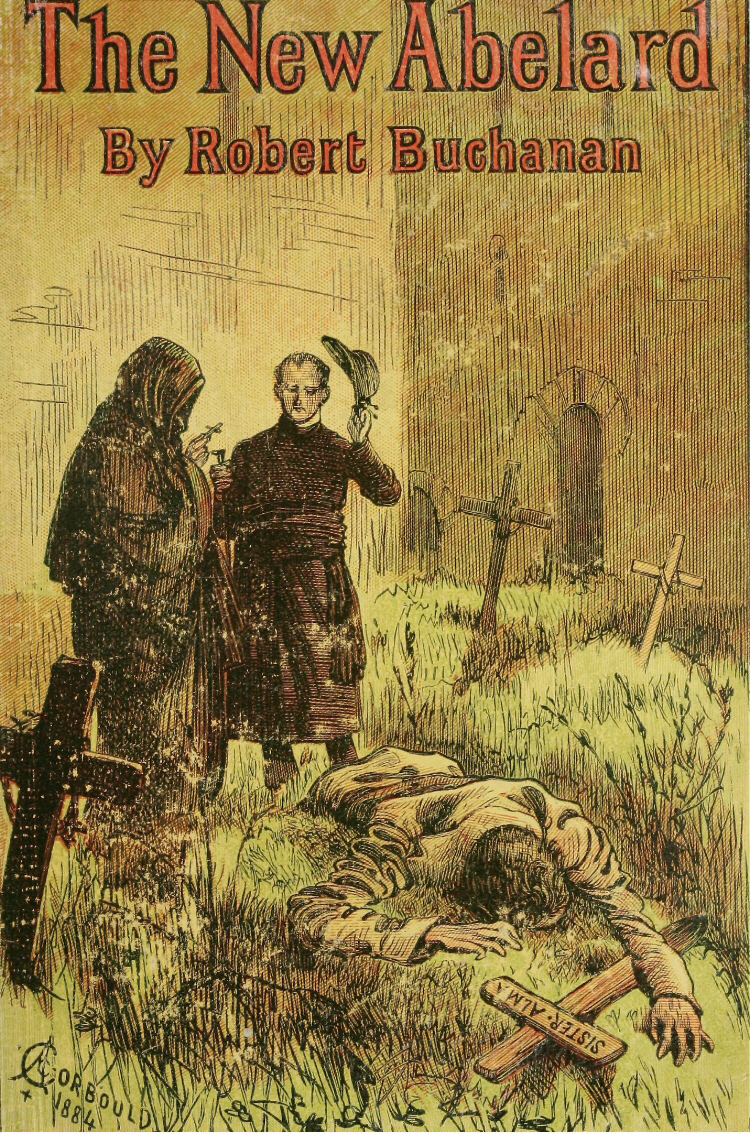 |
|||||||
|
You pays your money ... Finally, two short obituaries of Robert Buchanan from American magazines. One quite complimentary from Current Literature, and then this from Harper’s Weekly: ‘ROBERT WILLIAMS BUCHANAN, novelist, poet, playwright, and critic, who died in London, June 10, was best known perhaps for his attack in 1872 on the “Fleshly School of Poetry” established by SWINBURNE and ROSSETTI. That made a stir, and he followed it up with other attacks on other writers who seemed to him to need attention. A belligerent critic can always find plenty to say, and Mr. BUCHANAN, having good command of language, made many readable discourses about his contemporaries, promoting discussion and affording entertainment without much damage to the authors he assailed. He had an unusually complete experience of the vicissitudes of life; was extremely poor in his youth, and unluckily died bankrupt, though for many years he had carried his literary merchandise to a ready market.’ ‘Ouch!’ as they say. This one was made worse by the fact that it followed a full page given over to an obituary of Sir Walter Besant. _____
22 August 2022 I’ve just changed the date above from 18th June, and that was later than I intended. Tempus fugit and all that. Anyway, I finally get round to doing a bit of an update. First off I should mention Janet Fizz Curtis again, who is researching Irene Mawer (who has a quote from Balder the Beautiful on her gravestone). Janet emailed me on 25th May (just missing the last update) to let me know that she has put a page about Miss Mawer on wikipedia. So, congratulations are in order. I keep meaning to do something about the Robert Buchanan wikipedia entry but it always seems so complicated. Letters from Gourock One of the problems with editing the Buchanan wikipedia page is that there’s too much speculation about Buchanan’s life. For example, we know he lived for a time in Gourock (a seaside resort about 25 miles from Glasgow), but Harriett Jay makes no mention of it in her biography, so we don’t know how long he was there. The only evidence is a mention of the town in the obituary of Buchanan’s wife, Mary, in the Greenock Telegraph and the letters he sent to various people, which have managed to survive. Two more have just turned up. One in the Sampson Low Collection of the Open University, a letter of recommendation concerning William Black (another problem for the wikipedia page - no one knows why Buchanan broke off his friendship with Black). The text is here and a copy of the original is in the Open University’s digital archive. The other is a letter to Henry Allen (?) asking if he would be interested in “an elaborate criticism—very severe, but in some respects appreciative—on Matthew Arnold”. Since I’ve found no such article by Buchanan, presumably the answer from Henry Allen (?) was “No”. The text is here and a copy of the original is in the Wellesley College Digital Repository. Buchanan did write a review of Matthew Arnold’s New Poems for The Athenæum of 31st August, 1867, which I thought might give an indication of the tone of his proposed article, so I’ve added that to the Essays section. In his review, Buchanan singles out ‘Dover Beach’ for special mention. This poem, generally regarded as one of the key works of Victorian Literature, 17th on the list of The Nation’s Favourite Poems (chosen by the public in 1996), treated to a version by The Fugs on their 1968 LP, Tenderness Junction, is here described by Robert Buchanan: “Mr. Arnold is really very far gone. He cannot stand on the beach at Dover, and hear the solemn music of the sea, but the fatal weakness seizes him, and he must begin twaddling about Sophocles and the “sea of faith.” Here is the penalty of his culture,—to see, to hear, to feel nothing without making it the vehicle of intellectual self-consciousness,—to carry the shadow of Oxford everywhere, and find no deeper pleasure in ocean than a suggestion of the ‘Essays and Reviews.’ If this be the poet’s mood, the sooner we get rid of all our poets the better.” Attaboy Bob! ___
Fleshly again I would really like to let it go, but I came across some more accounts of the Fleshly School business so thought I’d better add them to the site. Extracts from: Rossetti (English Men of Letters) by Arthur C. Benson (London: Macmillan & Co., 1904.) Swinburne's Literary Career and Fame by Clyde Kenneth Hyder (1933, reissued 1963 - New York: Russell & Russell, Inc.) Poor Splendid Wings; The Rossettis and their Circle by Frances Winwar (Boston; Little, Brown and Co., 1933.) Dramas of the Law by Horace Wyndham (London: Hutchinson & Co. Ltd., 1936.) Explorations (‘A hundred years after’ by F. T. Flahiff) (January 1972) ___
Amazing what you find on google Following on from the last update about German translations of Buchanan’s novels, there’s a Dutch version of The Shadow of the Sword on google books, which was published in 1877 by the Gebroeders Kraay of Amsterdam under the title St. Napoléon. I will refrain from any speculation about the origins of the Kray Brothers. More importantly, for me anyway, is that Buchanan’s first book of poetry, Poems & Love Lyrics, is also now available via google. I don’t know how long it’s been on there. It says it was digitized in 2016 but I’m sure I’ve looked for it since then. I will add it to the site so that I will then only be missing one of Buchanan’s poetry books, the second one he published when he was still living in Glasgow, Mary, and Other Poems. I did find a couple of reviews of Poems and Love Lyrics, one in The Critic was quite complimentary: We have been delighted with Mr. Buchanan’s poems. Unobtrusive, soft, and sweet, they make their silent way into the memory of the reader. With simplicity of style the author has mingled metaphorical richness. Another in The National Magazine, less so: To this we may add Poems and Love Lyrics, by Robert W. Buchanan, which are not without promise; but they are the compositions of an author under sixteen years of age, and therefore necessarily very imperfect. |
|||||||
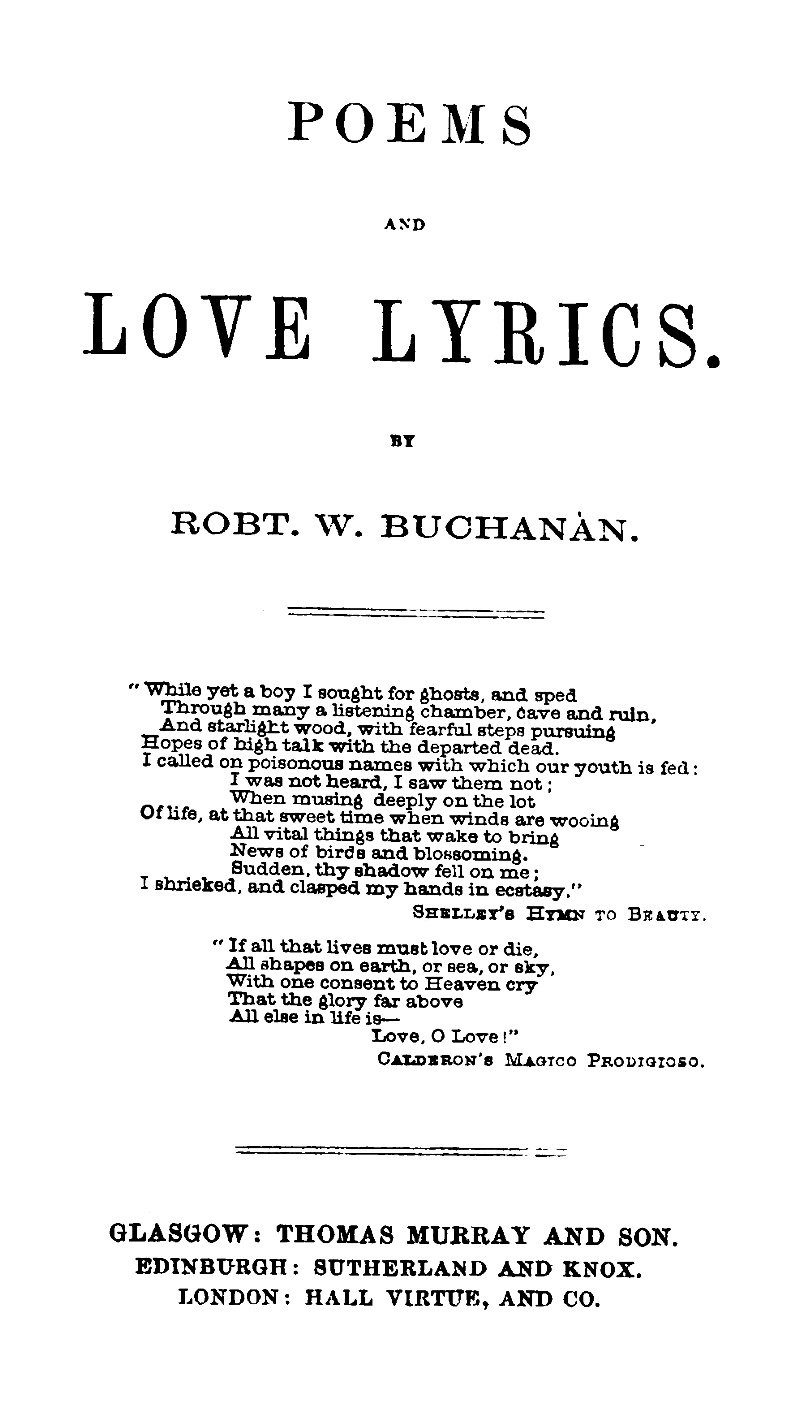 |
|
10 November 2022 As promised in the last update, I have now added Buchanan’s first book of poetry to the site: I’ve added a few notes to the transcription, mainly pointing out when some of the poems appeared in The Glasgow Sentinel and adding a couple of those if there were major changes. Other than that there isn’t much to say about the collection. It’s the work of an adolescent boy whose favourite word seems to be ‘bosom’, which, I guess is understandable. I was hoping there’d be clues to his later career, and although some of his regular themes pop up here and there, mainly to do with dead babies, there’s no real hint of what was to come. I suppose one could put on Dr. Roger Corder’s hat, fire up the tape recorder and have a fag (and congratulations to anyone spotting that reference) and link the obsession with dead babies to the death of his sister, Margaret Anne, at the age of seven weeks, but I really think it’s more of a standard theme for poetry at the time. Similarly, his one ‘political’ poem in the collection, ‘Poverty and Death’, is more a sketch for the opening act of a Victorian melodrama, and despite the subject of a dead baby and a destitute woman he can’t resist the following line: “Like thieves her tremulous bosoms swell”. I don’t get the simile. Then there’s a definite Poe rip-off, ‘Isabel’ and a lot of love lyrics addressed to ‘ Mary’ who is sometimes alive and sometimes dead. I think that’s a standard poetic device but I also wonder whether all these Mary poems, and the fact that his next book was called Mary and Other Poems, might have worked on his unconscious so that when he met Mary Ann Jay (and we don’t know where or when), he felt destined to marry her. Perhaps we should remove Dr. Corder’s hat now. One small mystery is solved however, why Buchanan decided to ignore his first book of poetry when he came to write his contribution to The Idler’s ‘My First Book’. ___
A couple of (more) famous writers 1. George Bernard Shaw. I came across this review by G. B. S. in The Saturday Review of 29th June, 1895: “The Strange Adventures of Miss Brown,” at the Vaudeville, is said to resemble a piece called “Charlie’s Aunt” (which I have not seen) in point of introducing a man disguised as a woman. Such disguises are usually more or less disagreeable; but this is not so in the present case. The piece, which is by Mr. Robert Buchanan and Mr. Charles Marlowe, offers itself unashamedly as pure fun and pastime for a couple of hours; and it succeeds perfectly. It is not silly or tedious, like most pieces with the same aim; it cannot tax the most ordinary brain, though the interest is kept up throughout; and it is irresistibly laughable. Mr. Frederick Kerr, as a huge schoolgirl in a red wig, is as pleasant and popular, and—to heighten the joke—as manly, as he usually is in the costume proper to his sex. Youth, good looks, and a pretty audacity serve Miss Palfrey’s turn better than the moderate degree of art she has so far acquired; Miss Esmé Beringer acts, and acts well, as the dark parlour boarder from Demerara; Mr. Robb Harwood made a hit as the German master; Mr. Beauchamp is a very Irish major struggling with a very English accent; and Miss Victor, Mr. Lionel Brough, and Miss Homfrey, assisted by half a dozen lesser lights, make up a cast that could hardly be improved. On the whole, I can recommend “Miss Brown,” even for the warmest nights. * 2. Knut Hamsun. I had a bit of a fling with Kurt Hamsun in my youth (his Hunger was very attractive to a sensitive adolescent soul) but then Hitler came between us and I was forced to let him go (I seem to be channeling that Woody Allen story about Hemingway), so I was fascinated by a mention of Robert Buchanan in Hamsun’s Fra det moderne Amerikas Aandsliv (Copenhagen, 1889). The Internet Archive has the English version (to borrow), The Cultural Life of Modern America, edited and translated by Barbara Gordon Morgridge (Cambridge, Massachusetts: Harvard University Press, 1969). What is fascinating about Hamsun’s description of Buchanan is that he gets it so wrong, which, given the latter’s strong links with Scandinavia, is also a bit disappointing. I’ve added the extract (and the editor’s note) to the end of the page dealing with Buchanan’s essay, ‘Free Thought In America’, which was published in The North American Review (April 1885). _____
Diary Archives:
|
|
|
|
|
|
|